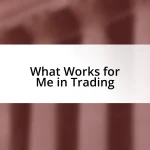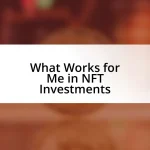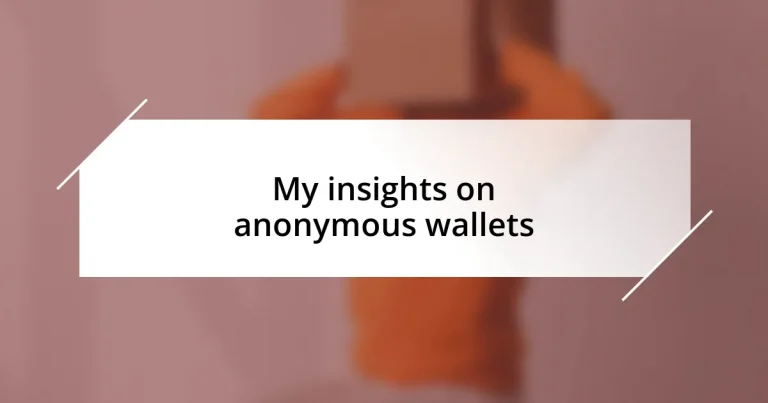Key takeaways:
- Anonymous wallets offer enhanced privacy and security from surveillance but can also lead to risks like financial fraud and irreversible transactions.
- Best practices for using anonymous wallets include double-checking recipient addresses, using multi-signature wallets, and conducting routine audits.
- The future of anonymous wallets may involve advanced privacy features and regulatory balance, potentially incorporating innovations like zero-knowledge proofs.
- Choosing the right wallet requires thorough research, community support, and a focus on personal needs for security and control over data.
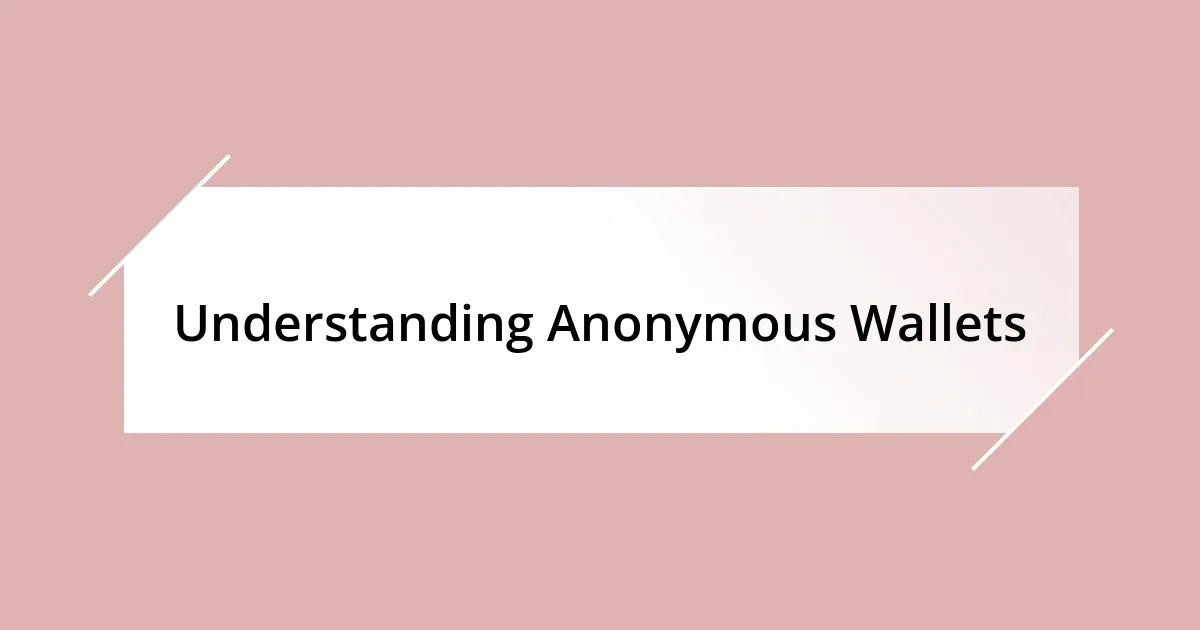
Understanding Anonymous Wallets
When I first learned about anonymous wallets, I felt a mix of curiosity and caution. These digital wallets offer a way to interact with cryptocurrencies without revealing personal identities, which can be appealing in today’s privacy-conscious world. But have you ever wondered what that level of anonymity could mean for your financial security?
Anonymous wallets operate on the principle of obscured ownership, typically using advanced encryption and blockchain technology. I still remember the first time I set one up; it was exhilarating yet a bit daunting. The thought of my transactions being untraceable felt empowering, yet it also raised questions about accountability. Can you truly trust a system where your identity is hidden?
Moreover, the allure of anonymity can sometimes mask potential risks. With my experiences, I’ve seen how easily people can become targets of fraud or loss if they don’t navigate these waters wisely. It makes me think: how much do we really value our privacy, and at what cost? As we dive deeper into the world of anonymous wallets, it’s crucial to evaluate not just the benefits but also the weight of our choices in this digital frontier.
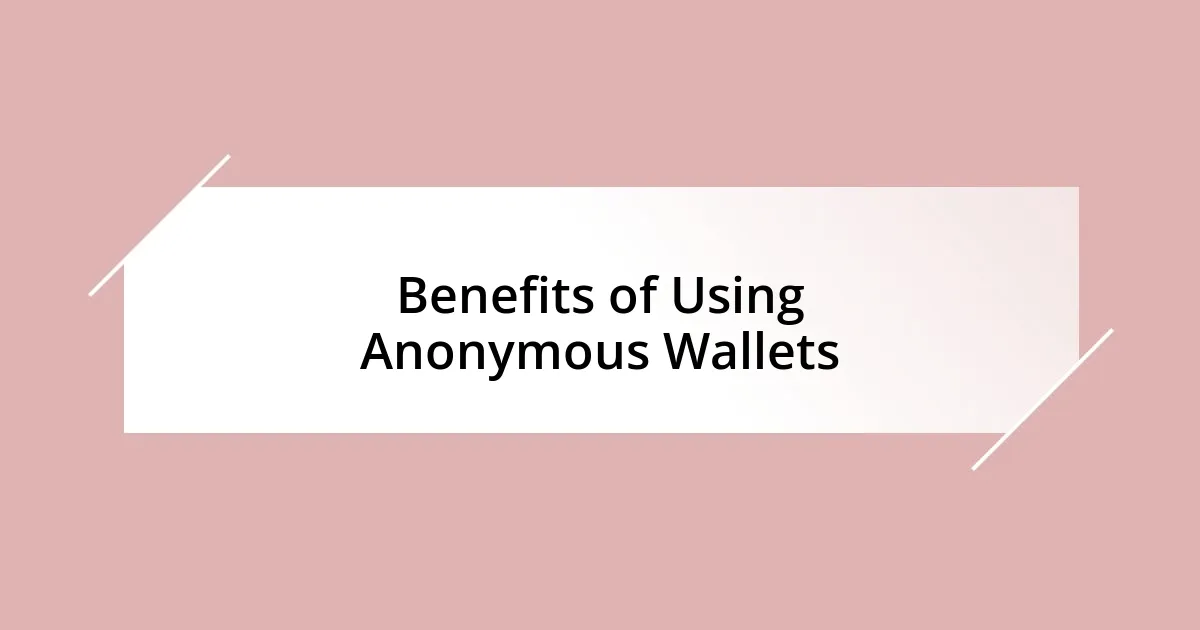
Benefits of Using Anonymous Wallets
Using anonymous wallets comes with distinct benefits that can be appealing for various users. On a personal note, I’ve always appreciated the control they provide over my financial privacy. Given how much of our personal information is shared online, having a financial tool that allows me to transact without disclosing my identity feels liberating. It’s like having a secret garden amidst an ever-expanding world of digital exposure.
Consider some specific advantages of using anonymous wallets:
- Enhanced Privacy: Users can conduct transactions without revealing personal information, safeguarding against data theft.
- Security from Surveillance: Individuals can protect their financial activities from unwanted scrutiny, offering a layer of security in a watchful world.
- Freedom from Traditional Finance: Anonymous wallets can bypass some of the limitations imposed by banks and financial institutions, offering users more autonomy.
In my journey exploring this space, it’s fascinating how these wallets can empower individuals to reclaim their financial independence while navigating a complex digital landscape.
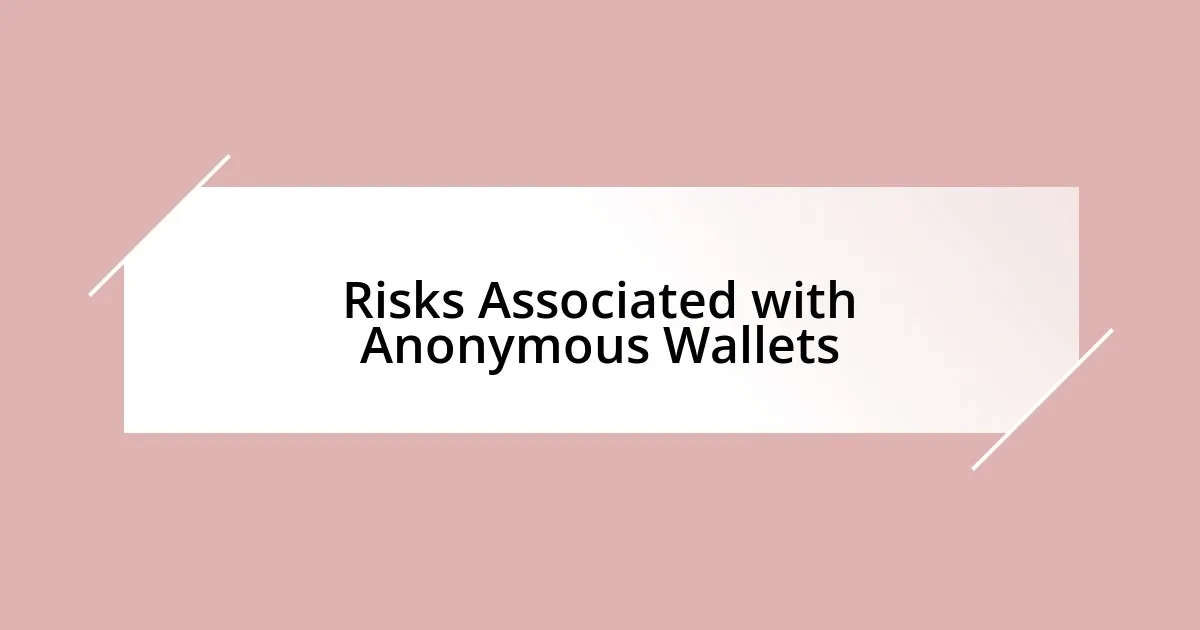
Risks Associated with Anonymous Wallets
Understanding the risks associated with anonymous wallets is essential. From my perspective, the lack of accountability can lead to financial harm. When I first started using one, I felt a rush of excitement, but that quickly turned to caution as I realized how easy it could be to fall prey to scams. Without a safety net of identity verification, it’s imperative to stay alert and discerning.
Another significant concern is the potential for irreversible transactions. I remember a time when I mistakenly sent funds to what I thought was a legitimate recipient, only to later find out it was a fraudulent address. In these situations, there’s no customer service to help, no recourse to recover losses. The anonymity that seems so appealing can also trap you in a web of irreversible mistakes.
Finally, the connection of anonymous wallets with illicit activities is hard to overlook. I often find myself questioning how many individuals willingly use these wallets for nefarious purposes. While I don’t believe that all users partake in illegal activities, this association can lead to increased scrutiny from authorities, putting even honest users at risk.
| Risk | Impact |
|---|---|
| Lack of Accountability | Increased chances of fraud and scams |
| Irreversible Transactions | Potential loss of funds without recovery options |
| Association with Illicit Activities | Heightened scrutiny from regulators |
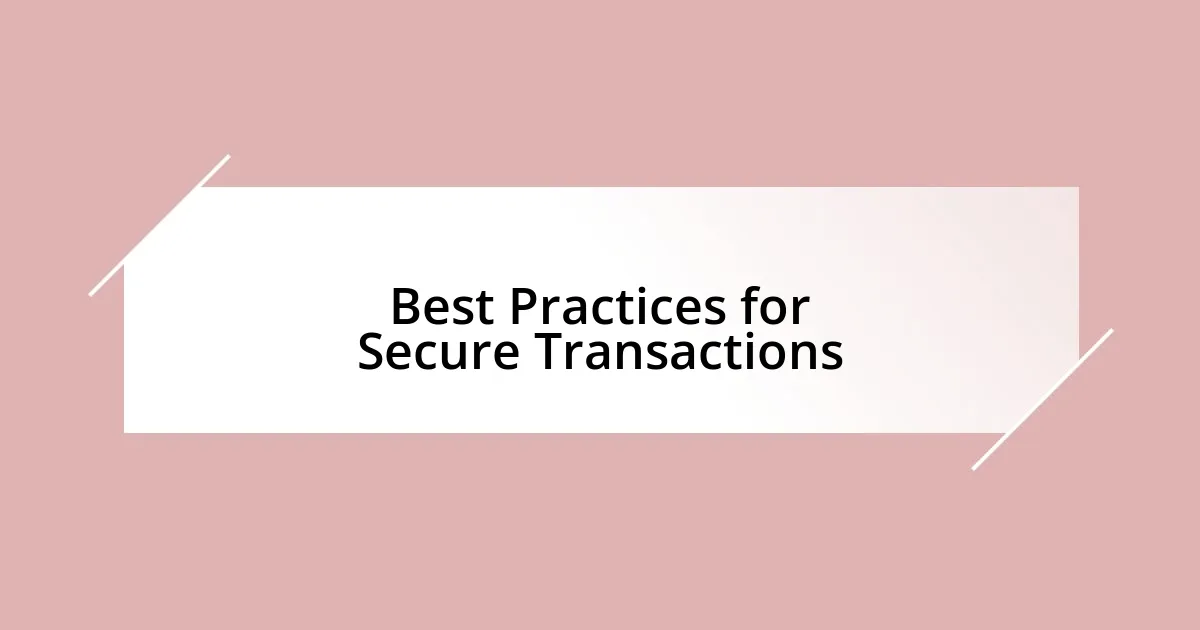
Best Practices for Secure Transactions
When it comes to secure transactions, I always advise double-checking a recipient’s address before finalizing a transfer. I learned this the hard way; one careless moment led me to sending funds to a typo, and chasing them down felt like searching for a needle in a haystack. This is a crucial practice because, in the world of anonymous wallets, once a transaction is confirmed, it’s irreversible.
Another best practice I’ve adopted is using multi-signature wallets for added security. This approach means that multiple keys are required to authorize a transaction, making it significantly more difficult for fraudsters to access my funds. Imagine feeling that extra level of assurance when making a move in the crypto space; it’s almost like having a personal bodyguard for your digital assets.
Routine audits of my wallet and transaction history have also become essential. I dedicate a few moments periodically to review my activity and ensure no unauthorized transactions have slipped in. This habit not only keeps my finances in check but also lets me catch potential issues before they spiral into bigger problems. Why wait for a scare when being proactive can bring peace of mind?
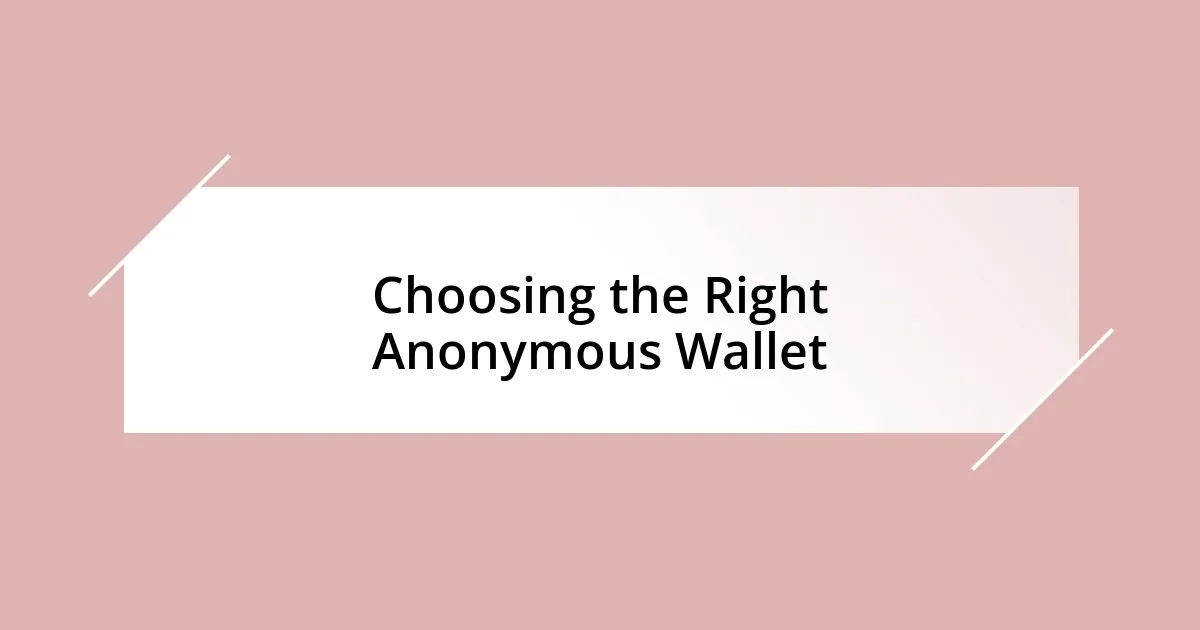
Choosing the Right Anonymous Wallet
Choosing the right anonymous wallet can be a daunting task, especially with so many options available. I remember sifting through various platforms, feeling overwhelmed by the features and claims of anonymity each one offered. It’s important to evaluate what you truly need, whether it’s robust security measures, user-friendliness, or integration with decentralized exchanges. What are the top three features you consider essential in your wallet? For me, it all boils down to how well it secures my assets while ensuring that I maintain control over my data.
Another aspect I find crucial is the community and support surrounding an anonymous wallet. During my initial exploration, I often felt isolated and unsure. Engaging with users on forums helped me understand which wallets had a solid reputation and a responsive support system. I can’t stress enough how vital it is to have a user base that can share experiences and insights. It adds a layer of confidence knowing that I’m not alone in navigating through this space.
Lastly, conducting thorough research and reading reviews cannot be overlooked in this process. Initially, I relied on a few flashy ads and got lured in by promises that didn’t hold up in reality. It’s easy to get swept away by marketing jargon. Instead, I trust real user experiences—stories of both success and caution. Have you ever made a choice based solely on someone else’s glowing review? I know I have, and sometimes it didn’t lead me in the right direction. Taking the time to look into various perspectives helps ground my decision-making process and ultimately makes my experience smoother.
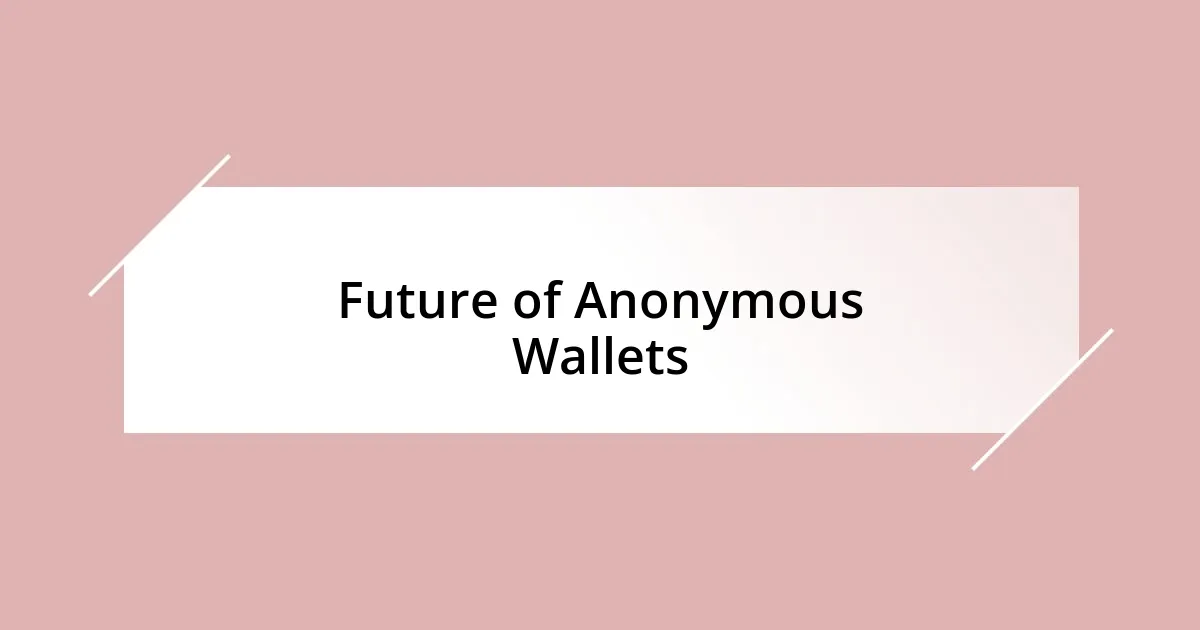
Future of Anonymous Wallets
The future of anonymous wallets is incredibly intriguing, and I genuinely believe we’re on the brink of innovative breakthroughs. I envision a time when these wallets integrate advanced privacy features, perhaps even using decentralized identity solutions. Have you ever imagined having total control over your personal data? For me, this could be a game-changer, allowing users to share only what they choose while keeping their transactions invisible to prying eyes.
As regulations around digital assets continue to evolve, I expect to see a balancing act between anonymity and compliance. I’ve often wondered how much transparency is too much; I remember a conversation with a fellow enthusiast who likened it to a tightrope walk. Striking that balance will be pivotal for the future of anonymous wallets, where we might see innovative solutions that provide a safeguard against illicit activities while still protecting user privacy.
There’s also the possibility of anonymous wallets adopting new technologies like zero-knowledge proofs. I experienced a bit of confusion when I first learned about these concepts, but the idea that one can prove ownership without revealing the underlying data is astonishing. Imagine a world where my transactions could remain completely private yet verifiable! It makes me hopeful for what’s to come, as I can’t help but think that these enhancements will lead to a more secure and user-friendly experience in the realm of digital finance.
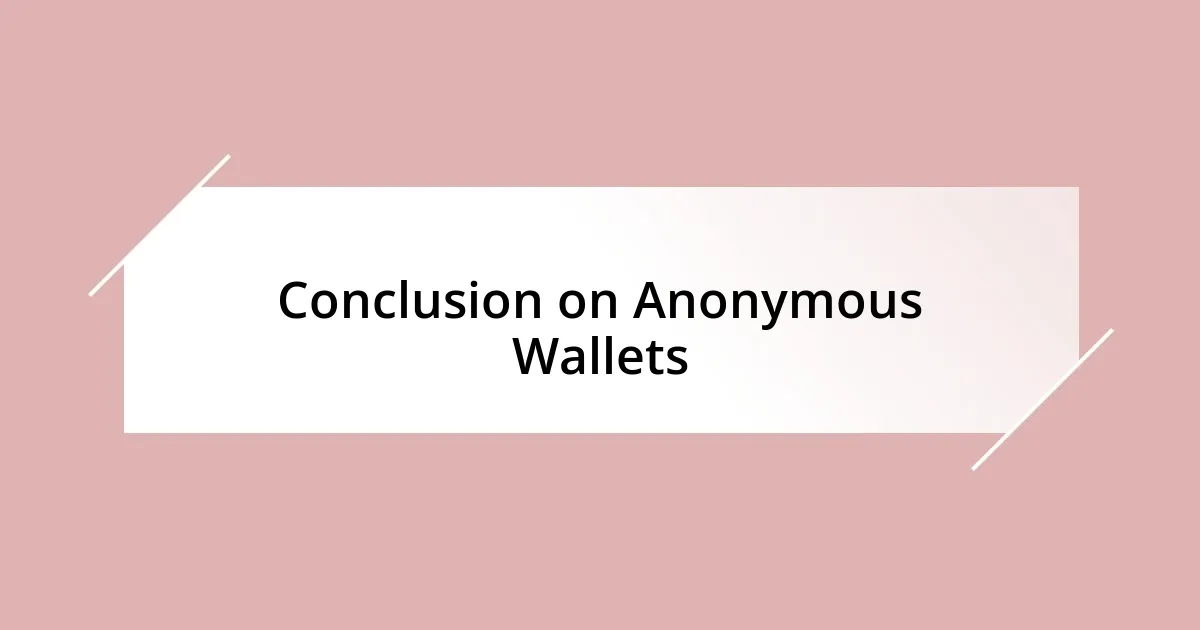
Conclusion on Anonymous Wallets
Navigating the world of anonymous wallets has taught me one key lesson: the balance between privacy and security is delicate yet essential. At times, I’ve found myself torn between wanting to remain anonymous and needing the peace of mind that my assets are fully protected. Can you relate to that inner conflict? I’ve come to realize that the right wallet can provide both without compromise, allowing us to hold onto our digital identities securely.
Reflecting on my journey with anonymous wallets, I remember a moment when I faced a potential security breach. It served as a wake-up call about the importance of due diligence and how even an anonymous wallet can be vulnerable. This experience underscored that while anonymity is a significant benefit, it must be paired with strong security practices to truly thrive in this space.
Ultimately, anonymous wallets can be a fascinating way to explore the digital finance world. They offer a layer of freedom but also come with responsibility. I often wonder, what does true anonymity look like in our interconnected society? As I continue to explore this landscape, I feel an enhanced understanding of how our choices shape our digital footprint, navigating the fine line between privacy and accountability.
